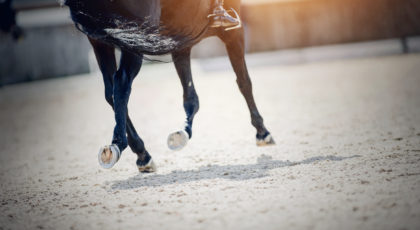One of your first lessons as a writer is using specific details, so the idea of show, don’t tell is burned into me.
I shiver when I see it done well, so in the first few drafts of this essay I wrote what usually served me. I included detail after biting detail about why, after all of the hurt, I had chosen not to tell my parents I had bought a horse of my own.
No matter how much I fussed and tweaked, the details fell flat. The thing about having abusive parents is that even our language can make it feel like we need to stop being dramatic because it wasn’t as bad as we thought it was.
It was as if the words I had to choose from were telling my adult self that I needed to suck it up, that honesty was the best policy – even when being honest and stoic with my parents hadn’t helped in the past.
The details also missed the essence of why my horse remains locked away from them, safeguarded by omission, distance and my own paycheck.
“I could tell them next week,” I often thought. “I could sprinkle it in with this good news or that mundane conversation.”
Then I changed my mind because there my horse stood, munching away on their hay or begging for treats at the gate, and my heart filled with a joy I had only read about in books.
Even though they voiced that they wished I had chosen something else, my parents had known about all the other horses, the ones that I leased, rode in lessons or came across in other ways. I owe a lot to all of those horses and their owners.
I loved many of them fiercely, and there was tremendous satisfaction in watching a horse thrive in their forever home after I had helped in their education. I also learned quickly that if the horse didn’t have my name on its registration papers I needed a check rein on my attachments.
Now here was a horse of my own, that I could saddle up and ride under the stadium lights in the outdoor arena whenever I wanted. I no longer had to ask anyone for permission to do what I thought was best for the animals I love.
I don’t have to take care of anyone’s feelings or watch something suffer for no reason the way I once did. Every time the farrier comes, or I treat an ailment the way I think it should be treated, I am overwhelmed by a sense of empowerment that is an intoxicating mixture of healing and humbling.
Why would I want to share that with people who usually tell me I am wrong and stupid?
“Mom and Dad are going to crap all over your choices no matter what, so you might as well do what you want,” I told one of my siblings recently. I left out that I was driving home from the barn, not wanting to risk it.
Along with not telling my parents about the horse, I have thought a lot about going no contact. While the jerk reaction of many is to say, “Oh, you should forgive them. They are your parents.” I know that for many adult children who have chosen estrangement, this wasn’t a choice made lightly, without sacrifice or without trying as much as possible to fix the relationship first.
As for me, I don’t think completely walking away is right for me, but perhaps keeping something for myself without them is. So, for now, my steed is my secret to keep. The happiness I have found with them can be mine to share with those who can be happy too and kept from those who would rather squash it.


 October 27, 2022
October 27, 2022 
























